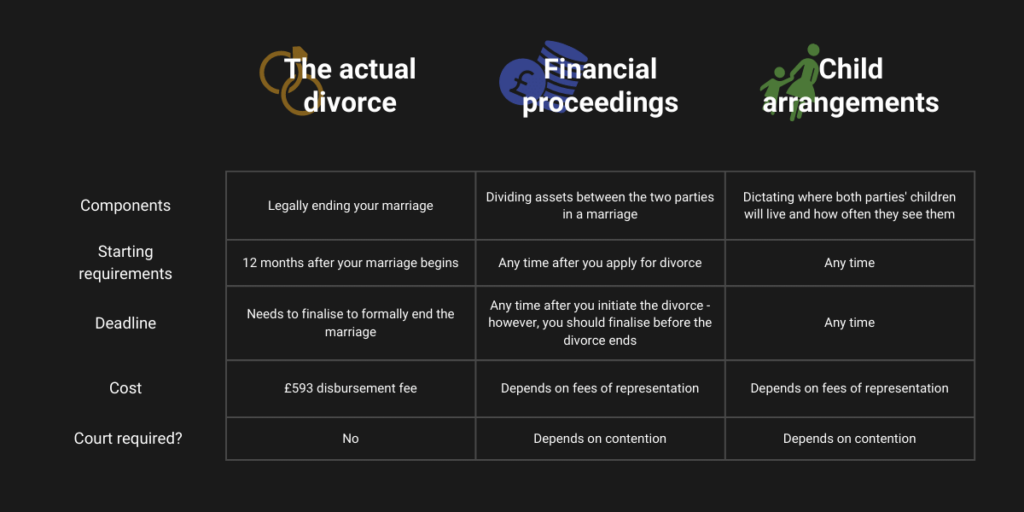Getting a divorce can be an incredibly stressful and exhausting process. Regardless of whether your partner is cooperative, the added stress of dealing with finances and children can be too much for some people.
Consequently, countless people are put off. Many think that the stress of divorce is not worth the hassle, meaning they simply grin and bear their grievances for the sake of their family or finances. You shouldn’t have to settle for this.
The government in recent years has simplified the divorce process down to make it more accessible for everyone. No-fault divorce and the ability to apply for applications online cuts out most of the worry for anyone getting a divorce. But whilst the divorce itself may be straightforward, the things that accompany it are less so.
If you and your partner have no assets together and no children, divorce will be a breeze. Most of the work will go into the application itself which, with the help of recent updates to the process, is easier than ever.
However, if you’ve been married for 15 years and share bank accounts, property and cars, it will be tricky. This is where you need an expert to advise you.
As Head of Family Law at Britton and Time Solicitors, I’ve created this series to outline the entire divorce process. It covers everything you’ll need to prepare, what you should consider, and how to go through the whole process from start to finish.
Below, you’ll find some basic information on getting a divorce in England and Wales, but other articles that expand on these areas in more detail will be featured throughout.
Getting a divorce: preparations
Before you take the plunge and focus purely on getting a divorce, it’s important to consider what this choice entails. There are things this decision may affect that you didn’t realise at first, alongside other options that may suit your situation better.
What do I need to consider?
Before you even think about applying for divorce, it’s worth first considering a number of things that may affect the process:
- Money – whilst fees for the divorce alone are minimal, it can become costly when financial proceedings turn sour. Think about what situation you or your spouse will be in if you cannot reach a mutual agreement, as court fees can add up quickly.
- Living standards – once a marriage has broken down, it’s common for one partner to move out during proceedings to give the other space. Decide early on where the party will be living to ensure it does not heavily impact their quality of life.
- Who else does it affect – If you have children or other family members living with you, think about how the divorce may affect them. It’s best, if possible, to keep divorce discussions private until you settle on a route forward.
- Do you truly want it? – Divorce is a big choice to make. If you’re having doubts, you should consider looking at alternatives before taking a step that may be irreversible.
You should always consider exactly who or what getting a divorce might affect. Plan accordingly.
What are the three main areas of divorce?
Getting a divorce is split into three categories:
- the divorce itself;
- financial proceedings; and
- child arrangements.
Importantly, these three areas can occur simultaneously, meaning you’ll be considering assets and children early on in the divorce. It’s important to consider these things early on so that you know who will take the majority of the assets and where your children will spend most of their time.

Getting a divorce: making an application
If you’ve decided that no other options will work, and getting a divorce is truly what you want, then the next stage is submitting a divorce application.
Am I eligible for a divorce?
Before proceeding with the divorce, you’ll first have to check that you’re eligible. This means that your marriage must:
- be at least 12 months old;
- have permanently broken down; and
- be legally recognised in the UK.
Furthermore, the UK must be your permanent home, or your spouse’s.
Do I need a specific reason to file for divorce?
No – there is no requirement in England and Wales to provide a reason for your divorce.
In the past, you needed to provide a ground for divorce. This meant citing a reason such as adultery or desertion.
However, since the No-Fault Divorce update in April 2022, this is no longer the case. Now, you simply have to state that your marriage has broken down to be eligible.
Which divorce application will I need?
To start the process, either one or both spouses will need to submit an application to the court.
The process differs slightly on whether you’re applying solely or dually.
Sole applications
In a sole application, one spouse will apply on their own. The party that applies for divorce becomes the applicant, whilst the other party becomes the respondent.
This means that the applicant is responsible for the entire application, including applying for the conditional order and final order. They’ll also need to pay the £593 application fee.
After the applicant files for divorce, the respondent receives divorce papers alongside an Acknowledgement of Service (AOS). This allows the court to confirm that they are aware of the divorce application.
You cannot change a sole application to a joint application.
Joint applications
In a joint application, both spouses will apply together. The party that applies becomes applicant 1, whilst the other party becomes applicant 2.
Whilst applicant 1 is the main point of contact, both parties are responsible for the application. This means that they will apply for the application, conditional order and final order together.
Both parties can share the £593 fee if they wish. However, if not, then applicant 1 will need to pay it.
You can change a joint application to a sole application later down the line if you wish.
What information will I need to provide?
To apply for divorce, alongside your relevant application, you’ll need to provide the following:
- you and your spouse’s full name and address; and
- your original marriage certificate.
If you don’t know your spouse’s address, or you don’t their whereabouts, you’ll have to try other methods instead. For example, you can instruct a tracing agent to find them.
What happens after I submit the application?
Once you submit your application, you’ll then have to wait for the conditional order. You’ll need to wait 20 weeks after the court grants your application to apply for it.
Once you have the conditional order, you’ll need to wait a further 6 weeks and 1 day to apply for the final order. After the court issues this, your marriage is officially over.
Typically, the court will grant both orders with no issue. However, it may be wise to delay applying for the final order until you finalise the financial proceedings. This is because getting a divorce will complicate things financially.
Getting a divorce: the other areas.
As mentioned prior, the divorce application isn’t the only area that you’ll need to consider. If you share assets and have children with your partner, you should definitely think about how you’d like the division of assets and child arrangements to unfold.
The financial settlement
The financial settlement is easily the most contentious and complicated part of getting a divorce.
Any marital assets that you and your spouse share will be brought up in the financial settlement discussion. This includes property, bank accounts, pensions or any other accumulation of wealth.
Whilst non-marital assets include things you or your spouse owned prior to the marriage, these are still not entirely safe from financial discussions. For example, your spouse could make a claim on a property you owned prior to the marriage, which you let out to renters, as you’ve used this extra income to pay for your children’s education.
This is the part of divorce that notoriously causes the most trouble. You’ll need an expert to outline what you’re entitled to.
Child arrangements
Whilst not mandatory to complete before their marriage ends, many couples sort out their child arrangements alongside their divorce.
Your child arrangements will include things like:
- choosing where your children will live and who with;
- allocating time for each spouse to see their children;
- specifying times for calls and other forms of communication; and
- child maintenance plans.
If you have children, this will drastically affect the court’s decisions in handling finances too. They tend to favour the side that the children spend the majority of their time with.
Should I consider mediation?
With family mediation, you can potentially reach some middle-ground with your spouse regarding finances and children. A third-party mediator will help to accomplish this.
It’s never too late to try mediation and the courts will tend to favour the side that has tried to be more amicable.
Getting a divorce: what happens next?
Officially, your marriage is now over. Hopefully, you have finished the financial proceedings and are ready to start anew.
Although, there are a few other things you may need to consider for life after divorce. For example, you may need to rewrite your will or consider capital gains tax from any assets you acquire.
What if divorce isn’t for me?
If you find that getting a divorce might not be the answer, you should consider some alternatives. If you’re unhappy in your marriage, but you don’t want a divorce, there are a number of options available for you to try:
Marriage counselling
If you think you can still remedy the breakdown in your marriage, you should first look at counselling.
Informal separation
Instead of getting a divorce, couples can agree to live apart whilst not officially ending their marriage.
Annulment
If you think that your marriage was never legally valid, or has become invalid in some way, you can apply for annulment.
Judicial separation
Whilst judicial separation does not end a marriage in the same way as divorce, it does formally end the marriage.
The final verdict
In spite of all the recent changes making the process simpler, getting a divorce can still prove to be a stressful experience.
Whilst it may be overwhelming, our team of expert divorce solicitors can help. I’ve seen my fair share of complex divorces, meaning regardless of how niche or contentious your divorce may be, we can help.
Whether you’re considering your options, looking to apply, or need advice on finances or children, contact us today and we can guide you through your divorce.
To get started, have a look through our ‘Getting a Divorce’ series by visiting the blogs below.

